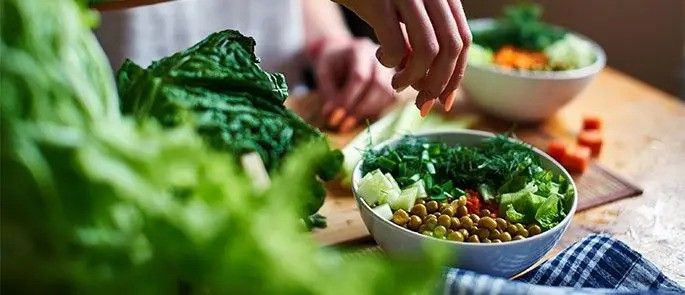The majority of people in the UK have an inaccurate idea of what vegan food can or cannot contain, which puts those with food allergies at risk, a survey by leading allergen awareness training provider High Speed Training reveals.
The survey, which sampled 2,187 UK participants, aimed to reveal common perceptions and misconceptions regarding vegan food and its relation to food allergies. Based on the results, 72% of respondents, and 75% of those with a food allergy, believe that vegan food does not contain any ingredients derived from animals, making it safe for individuals with allergies to ingredients such as milk, eggs, fish, crustaceans or molluscs.
High Speed Training’s latest report highlights that this perception is in fact false. While the term 'vegan' generally implies that products do not contain ingredients sourced from animals, the reality of food manufacturing processes can lead to the presence of animal-based allergens in vegan products.
The training company’s report concludes that this worrying misalignment between public views and reality can be put down to the current lack of a legal definition of vegan food. Without a legal definition that strictly prohibits any presence of animal-derived ingredients, the public cannot be sure that what they’re eating is in line with their beliefs and dietary requirements.
Why is this such a problem? For the consumer, it may lead to misguided choices, particularly for those who seek to avoid animal products due to ethical or environmental reasons. Moreover, it poses potentially life-threatening risks for individuals with food allergies.
The stark consequences of this are evident in the case of Celia Marsh, a 42 year old mother of five and dental nurse diagnosed with a cow’s milk allergy, who in 2017 died after eating a super-veg rainbow flatbread from Pret a Manger labelled as ‘vegan’ and ‘dairy-free’ which, unbeknownst to her, was contaminated with milk protein.
High Speed Training has been a leading food safety course provider since its conception in 2008, which began with offering Level 2 Food Hygiene and Safety training, a course which is still their most popular. More recently, they’ve been noted for going beyond standard guidance in their Food Allergen Awareness training, which is the first to be officially endorsed by the Owen’s Law Campaign. In creating their latest report, the company aims to raise awareness of th e absence of a legal definition for vegan food and advocate for the creation of a definition to better safeguard consumer health.
Furthermore, the company isn't alone in their concern, with their findings showing that 74% of survey respondents agreed that there should be a clear definition for vegan food, indicating strong support of the cause. Additionally, the Chartered Trading Standards Institute (CTSI) have recommended the creation of a legal definition for vegan food, helping to put more weight behind the argument.
The ongoing discussion begs one important question: What is the future of vegan food labelling? Whilst it’s clear that change is required to avoid dangerous misconceptions and safeguard allergy sufferers, it’s also important not to isolate the vegan community in doing so, as the term ‘vegan’ ultimately belongs to the community that coined it. Currently, the Vegan Society recognises products as vegan as long as the manufacture of the product and its ingredients do not involve the use of any animal product or derivative. This certification does not ensure that products with the Vegan Trademark are necessarily suitable for those with animal-derived food allergies such as milk or eggs, however.
Clearly, a compromise must be found between the Vegan Society’s view of what qualifies as vegan, and food manufacturing processes that ultimately provide safety for allergy sufferers. Alex Gazzola, a writer specialising in food allergies, intolerances and coeliac disease, offers his support to a middle ground, saying: "If a food meets the Vegan Society definition, it is vegan. If it does not, it is not. There is no 'in between' or third ground under the current definition. I do like the idea of a third ground, I should add - 'vegan' and 'vegan plus', for example, to take into account foods with and without potential cross-contamination"
As a notable provider of food allergen awareness training, High Speed Training’s Vegan Food Report combines survey data with written accounts from various members of the food manufacturing industry, allergy sufferers, and hypersensitivity experts, to give a comprehensive overview of the current issues facing vegan labelling. Additionally, they hope the report will help to educate the public, particularly those with an animal-based food allergy, on the truth behind what a ‘vegan’ label means to better equip people with the knowledge needed to keep themselves safe.
Dr. Richard Anderson, head of Learning and Development at High Speed Training, sums this up, saying: “It’s incredibly important for food labelling and descriptions to match the ingredients and manufacturing methods used to create the product. Without this, the public are unable to make informed choices about what they eat to match their beliefs and dietary requirements, whether these are ethical or medical. Ultimately, a lack of understanding or clarity on what a food label, such as ‘vegan’, entails can be life-threatening."
"Our report shows that there is currently a widespread and potentially dangerous misconception into what a ‘vegan’ label means for the food product on which it’s placed, with the vast majority of people believing that vegan food is safe for individuals with animal-based allergies, such as milk or eggs, to eat. As this is not the case, it’s paramount we act to reduce this misunderstanding and protect the health of allergy sufferers."
"At High Speed Training, one of our principle missions is to leave things better than we found them, and thus our advocacy of increased allergy awareness aims to make the food industry safer for those with life-threatening hypersensitivities. Whilst our report is helpful in raising awareness of the current reality behind vegan labelling and reducing misconceptions, we advocate for a change in the law to introduce a clear definition of vegan food. This is the best way to ensure consumers can make informed dietary decisions and protect their health.”






